UNIFY NYLON - 4/0, 18" - Medium - 19mm, 3/8 Circle, Rev Cut - Black Color, Box of 36
UNIFY
Write a Review

UNIFY
NYLON - 4/0, 18" - Medium - 19mm, 3/8 Circle, Rev Cut - Black Color, Box of 36
- Item #:
- M-N418XR19
- Thread Size:
- 4/0
- Needle Spec:
- 19mm, Reverse Cutting
- Comparable Needles:
- FS-2 / C-13 / C6
- Thread Length:
- 18 in (45cm)
- Color:
- Black
- Packing:
- Box of 36 Pieces
NYLON - 4/0, 18" - Medium - 19mm, 3/8 Circle, Rev Cut - Black Color, Box of 36
UNIFY® Nylon Surgical Sutures
- Minimal tissue reaction
- Smooth flow through tissue while maintaining optimal knot security
- Ultra sharp needle point for atraumatic tissue penetration
- Needle coated with silicone for smooth tissue passage
- Thread type: Monofilament
- Color: Black
- Strength duration: 2 Year
- Absorb duration: N/A

UNIFY sutures are great. When you need a suture to really hold, they do it.
David Hansen, MD
Plastic Surgeon, Los Angeles, CA

Nylon Thread
Comparable to Ethilon* and Monosof**
- Product Name:
- NYLON - 4/0, 18" - Medium - 19mm, 3/8 Circle, Rev Cut - Black Color, Box of 36
- Item #:
- M-N418XR19
- Brand:
- UNIFY
- Manufacturer:
- Private Label Manufacturing Partners
- Needle Size:
- 19mm
- Needle Curvature:
- 3/8 Circle
- Needle Cutting:
- Reverse Cutting
- Thread Size:
- 4/0
- Thread Length:
- 18 in (45cm)
- Color:
- Black
- Comparable Needles:
- FS-2 / C-13 / C6
- Product Line:
- Regular Sutures
- Thread Material:
- Nylon
- Packing:
- Box of 36 Pieces
- Absorbability:
- Non-Absorbable
- Strength:
- 2 years
- Thread Type:
- Monofilament
- Synthetic:
- Yes
- Tensile Strength:
- High
- Comparable Material:
- Ethilon / Monosof
- Tissue Reaction:
- Minimal
- Wicking Behavior:
- No
- Shape Memory:
- Low
- Knot Safety:
- Good
- Smooth:
- Good
- Sawing Effect:
- No
- samples:
- yes
Surgical sutures are commonly used in a variety of surgical procedures to close wounds and promote healing. Here are some general guidelines for using surgical sutures:
1. Choose the appropriate size and material: Surgical sutures come in a range of sizes and materials to suit a variety of surgical procedures. The size of the suture should be appropriate for the tissue being sutured, and the material should be chosen based on the patient's allergies, tissue compatibility, and surgical requirements.
2. Use proper instrumentation: Surgical sutures require special instruments, including a surgical needle holder and forceps. These instruments are designed to provide precise control and prevent damage to surrounding tissues.
3. Ensure proper placement: When placing surgical sutures, it is important to ensure that they are properly placed to achieve the desired outcome. This requires good visualization and a steady hand.
4. Use a proper technique: Surgical sutures can be placed using a variety of techniques, depending on the surgical procedure and the surgeon's preference. Some common techniques include interrupted sutures, continuous sutures, and running sutures. It is important to use a technique that provides adequate tissue approximation and minimizes tissue trauma.
5. Minimize tissue trauma: When using surgical sutures, it is important to minimize tissue trauma by handling tissues gently and avoiding excessive tension on the suture. This can help to reduce the risk of complications such as tissue necrosis or scarring.
6. Follow manufacturer's instructions: Surgical sutures should be used according to the manufacturer's instructions, including sterilization and storage recommendations. It is important to use only sterile sutures and to dispose of used sutures properly.
Overall, using surgical sutures requires a high level of skill and precision. Surgeons who use these sutures should have specialized training and experience in using surgical sutures. By following proper techniques and handling procedures, surgeons can help to ensure optimal outcomes for their patients.


UNIFY NYLON - 3/0, 18" - Medium - 19mm, 3/8 Circle, Rev Cut - Black Color, Box of 36


UNIFY NYLON - 5/0, 18" - Medium 19mm, 3/8 Circle, Rev Cut - Black Color, Box of 36


UNIFY NYLON - 5/0, 18" - Small - 13mm, 3/8 Circle, Rev Cut - Black Color, Box of 36


UNIFY NYLON - 6/0, 18" - Small - 13mm, 3/8 Circle, Rev Cut - Black Color, Box of 36


UNIFY Nylon Surgical Sutures, Size 4/0, 10" Thread with 19mm 3/8 Circle R/C Needle. Black. Box of 36

MERITPOINT Micro Syringes with Ultra-Fine Needle


B.BRAUN Luer-to-Luer Fluid Dispensing Connectors

MEDIGRATIVE Sterile Luer Lock Syringe Tip Caps


KBMED Safety Blood Collection Sets (without holder)


UNIFY Premium+ Fast Absorbing Gut Surgical Sutures, Size 6/0, 18" Thread with 13mm 3/8 Circle R/C Needle. Beige. Box of 12.


UNIFY Chromic Gut Surgical Sutures, Size 6/0, 18" Thread with 13mm 3/8 Circle R/C Needle. Brown. Box of 12.


UNIFY Chromic Gut Surgical Sutures, Size 5/0, 18" Thread with 13mm 3/8 Circle R/C Needle. Brown. Box of 12.


UNIFY Chromic Gut Surgical Sutures, Size 4/0, 18" Thread with 13mm 3/8 Circle R/C Needle. Brown. Box of 12.


UNIFY Nylon Surgical Sutures, Size 4/0, 18" Thread with 19mm 3/8 Circle R/C Needle. Black. Box of 12.


UNIFY Premium+ Plain Gut Surgical Sutures, Size 5/0, 18" Thread with 13mm 3/8 Circle R/C Needle. Beige. Box of 12.
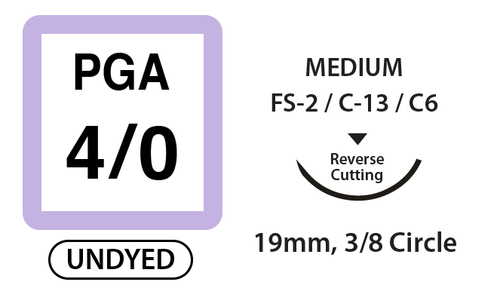

UNIFY PGA Surgical Sutures, Size 4/0, 18" Thread with 19mm 3/8 Circle R/C Needle. Undyed. Box of 12.
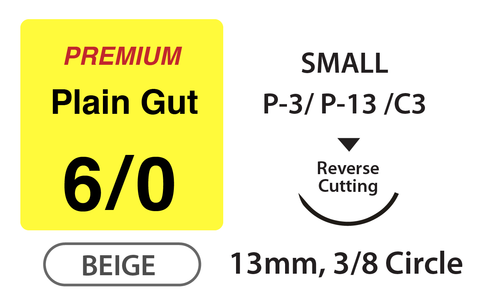
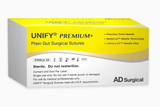
UNIFY Premium+ Plain Gut Surgical Sutures, Size 6/0, 18" Thread with 13mm 3/8 Circle R/C Needle. Beige. Box of 12.


UNIFY Polypropylene Surgical Sutures, Size 6/0, 18" Thread with 13mm 3/8 Circle R/C Needle. Blue. Box of 12.


UNIFY Nylon Surgical Sutures, Size 5/0, 18" Thread with 13mm 3/8 Circle R/C Needle. Black. Box of 12.


UNIFY Polypropylene Surgical Sutures, Size 4/0, 18" Thread with 19mm 3/8 Circle R/C Needle. Blue. Box of 12.


UNIFY PGA Surgical Sutures, Size 5/0. 18" Thread with 13mm 3/8 Circle R/C Needle. Undyed. Box of 12.


UNIFY PGA Surgical Sutures, Size 3/0, 18" Thread with 19mm 3/8 Circle R/C Needle. Violet. Box of 12.


UNIFY Polypropylene Surgical Sutures, Size 5/0, 18" Thread with 13mm 3/8 Circle R/C Needle. Blue. Box of 12.

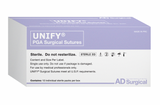
UNIFY PGA Surgical Sutures, Size 3/0, 18" Thread with 19mm 3/8 Circle R/C Needle. Undyed. Box of 12.


UNIFY PGCL Surgical Sutures, Size 5/0, 18" Thread with 13mm 3/8 Circle R/C Needle. Undyed. Box of 12.


UNIFY PGCL Surgical Sutures, Size 4/0, 18" Thread with 13mm 3/8 Circle R/C Needle. Undyed. Box of 12.
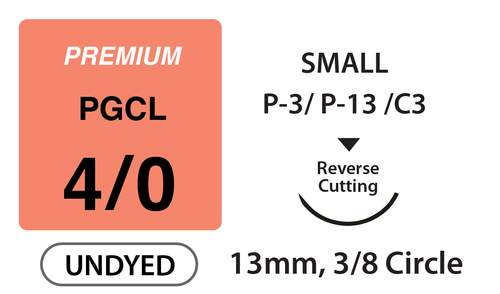

UNIFY Premium+ PGCL Surgical Sutures, Size 4/0, 18" Thread with 13mm 3/8 Circle R/C Needle. Undyed. Box of 12.
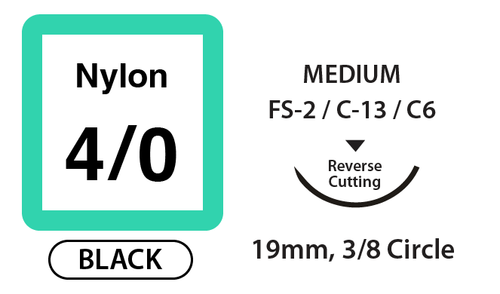
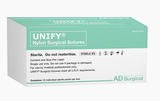
UNIFY Nylon Surgical Sutures, Size 4/0, 10" Thread with 19mm 3/8 Circle R/C Needle. Black. Box of 12.
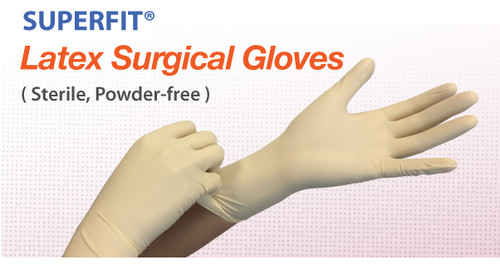

SUPERFIT Sterile Latex Surgical Gloves


UNIFY PGCL Surgical Sutures, Size 4/0, 18" Thread with 19mm 3/8 Circle R/C Needle. Violet. Box of 12.

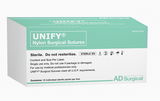
UNIFY Nylon Surgical Sutures, Size 3/0, 18" Thread with 19mm 3/8 Circle R/C Needle. Black. Box of 12.


UNIFY Premium+ Nylon Surgical Sutures, Size 4/0, 18" Thread with 19mm 3/8 Circle R/C Needle. Black. Box of 12.


AD SURGICAL Universal Sterile Surgical Drapes

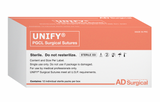
UNIFY PGCL Surgical Sutures, Size 4/0, 18" Thread with 19mm 3/8 Circle R/C Needle. Undyed. Box of 12.


UNIFY PREMIUM+ PDO Surgical Sutures, Size 3/0, 18" Thread with 19mm 3/8 Circle R/C Needle. Violet. Box of 12.


UNIFY Premium+ Fast Absorbing Gut Surgical Sutures, Size 5/0, 18" Thread with 13mm 3/8 Circle R/C Needle. Beige. Box of 12.


UNIFY Premium+ Chromic Gut Surgical Sutures, Size 5/0, 18" Thread with 13mm 3/8 Circle R/C Needle. Brown. Box of 12.


UNIFY Nylon Surgical Sutures, Size 6/0, 18" Thread with 13mm 3/8 Circle R/C Needle. Black. Box of 12.
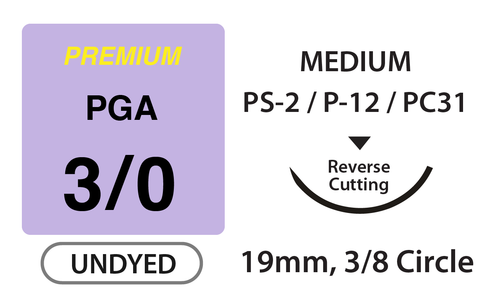

UNIFY Premium+ PGA Surgical Sutures, Size 3/0, 18" Thread with 19mm 3/8 Circle R/C Needle. Undyed. Box of 12.


UNIFY PGCL Surgical Sutures, Size 3/0, 18" Thread with 19mm 3/8 Circle R/C Needle. Undyed. Box of 12.


UNIFY PGA Surgical Sutures, Size 4/0, 18" Thread with 13mm 3/8 Circle R/C Needle. Undyed. Box of 12.
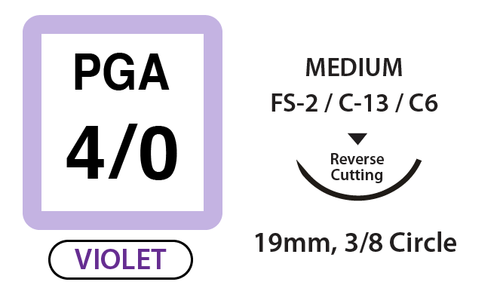
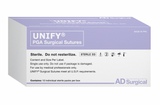
UNIFY PGA Surgical Sutures,Size 4/0, 18" Thread with 19mm 3/8 Circle R/C Needle. Violet. Box of 12.


UNIFY PDO Surgical Sutures, Size 2/0, 30" Thread with 24mm 3/8 Circle R/C Needle. Violet. Box of 12.


UNIFY Nylon Surgical Sutures, Size 4/0, 18" Thread with 13mm 3/8 Circle R/C Needle. Black. Box of 12.













